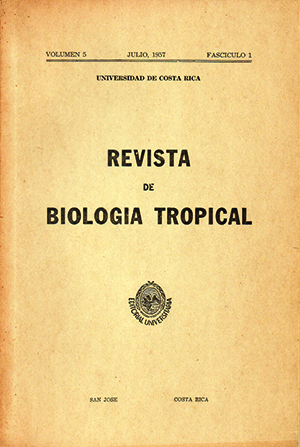Abstract
A study is presented of the,outstanding aspects of the biology of Central American Telenomus fariai, an endophagolis parasite on eggs or certain Triatominae, found on eggs of Triatoma phyllosoma in the laboratory by Dr. Luis M, Peñalver of El Salvador. The little wasp was found capable of parasitizing under experimental conditions eggs of T. dimidiata of Costa Rica, of T. phyllosoma of México, of Panstrongylus chinai of Ecuador, and of P. megistus of Brasil. It proved unable to attack eggs of T. infestans of Chile, of Rhodnius prolixus of El Salvador, and of R. pallescens of Panamá. The fact that it does not attack eggs of T. infestans is the only difference observed from Telenomus fariai described in Brazil by Costa Lima, other than an apparently inferior capacity for laying and shorter mean duration of life. Infestation may or may not follow the attack on eggs of hemipterae in advanced stages of development; in the negative case, death results occasionally from mechanical injury. Several counts were made of the little wasps developing within the eggs of T. phyllosoma, T. dimidiata, and P. chinai, noting the total number of insects, the number of each sex and the mean number of wasps per egg. The relation ship of the latter figures with the size of the host eggs was investigated, and a close relationship was found between the two values: each Telenomus requires from 0.00019 to 0.00025 gm. and from 0.178 to 0.193 mm3. With a variable temperature incubator the influence of temperature on development of Telenomus was demonstrated. At 30° C. complete development was obtained in 19 days on P. chinai and in 20 days in T. phyllosoma. At room temperature development was completed in from 32 to 42 days. Host eggs were dissected just before the parasites left them and groups of females were separated after periods of various length. It was shown that females separated after up to 1 hr. of initial contact with the male gave parth enogenetic progeny; fertilization, therefore, occurs after that periodo Measurements were made on females and on both types of males of Telenomus; parthenogenetic males were found to be larger than normal males, and females to be larger than either. Remarks are made on the possibility of biological control of vectors of Chagas disease.##plugins.facebook.comentarios##
Downloads
Download data is not yet available.






